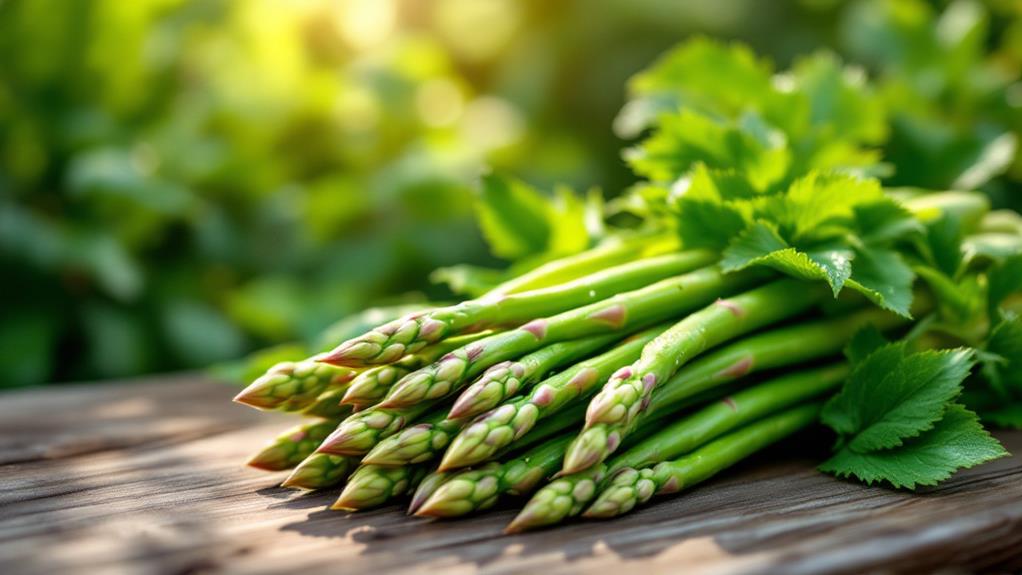A Complete Guide to Lemon Basil: Growing, Uses, and Health Benefits
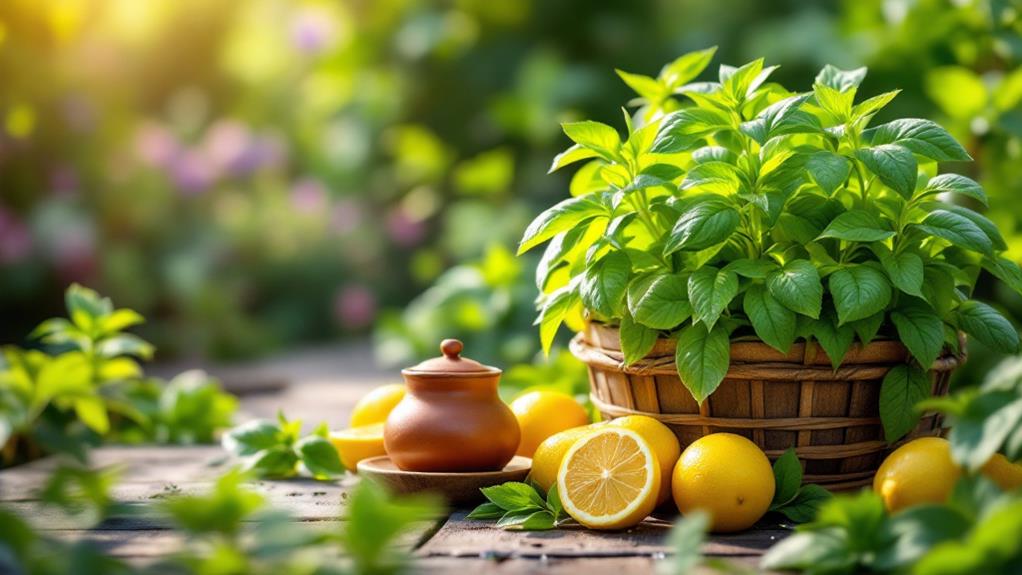
Lemon basil, known for its lemony aroma and flavor, is a great enhancement to your culinary creations, from salads to flavorful pestos. Not only does it improve dishes, but it's also packed with health benefits. It's a rich source of vitamins A, C, and K, supports your digestion, and offers anti-inflammatory and antibacterial properties. To grow it, you'll need well-drained soil, full sun, and regular pruning to promote bushier growth. Harvest in the morning before flowering for the best flavor. Uncovering the intricacies of growing and using lemon basil could raise your garden and kitchen to a whole new level.
Understanding Lemon Basil
Lemon basil, known scientifically as *Ocimum × citriodorum*, is a unique herb that combines the qualities of sweet basil and Thai basil with a distinct lemony aroma. As an aromatic herb, it's cherished in Southeast Asian cuisine, especially in Thai dishes. You'll find that lemon basil adds a revitalizing lemon scent and flavor to seafood, soups, and salads, enhancing their taste profiles.
Beyond its culinary uses, lemon basil is packed with health benefits thanks to its crucial oils, such as citral and limonene. These oils are known for their anti-inflammatory and antimicrobial properties, which play a significant role in disease prevention. By incorporating lemon basil into your diet, you may support your body's defenses against infections and reduce inflammation naturally.
This herb also thrives in warm climates, needing full sun and well-drained soil—perfect for both indoor and outdoor gardens. Growing lemon basil not only guarantees a fresh supply for your kitchen but also contributes to your wellness. Infusing lemon basil in teas or beverages offers a stimulating twist that can promote digestive health and help reduce stress, making it a versatile enhancement to your health regimen.
Nutritional Profile
While many herbs add flavor to your dishes, lemon basil stands out with its impressive nutritional profile. This lively herb is more than just a culinary delight; it's packed with nutrients that support your comprehensive well-being. Lemon basil is a rich source of Vitamin K, vital for blood clotting and maintaining strong bones. You'll also find significant amounts of vitamins A and C, both important for enhancing your immune system and promoting healthy skin.
Adding lemon basil to your meals doesn't just improve flavor; it contributes to your daily nutritional intake. The herb is low in calories, making it an excellent choice if you're mindful of your weight. It also offers dietary fiber, which is crucial for digestive health and helps maintain a healthy gut. This fiber not only aids digestion but also keeps you feeling fuller longer, a handy benefit if you're managing your diet.
Magnesium is another key component of lemon basil's nutritional profile. This mineral is essential for muscle and nerve function, ensuring your body operates smoothly. By incorporating lemon basil into your diet, you're embracing a flavorful way to enjoy multiple health benefits.
Health Benefits
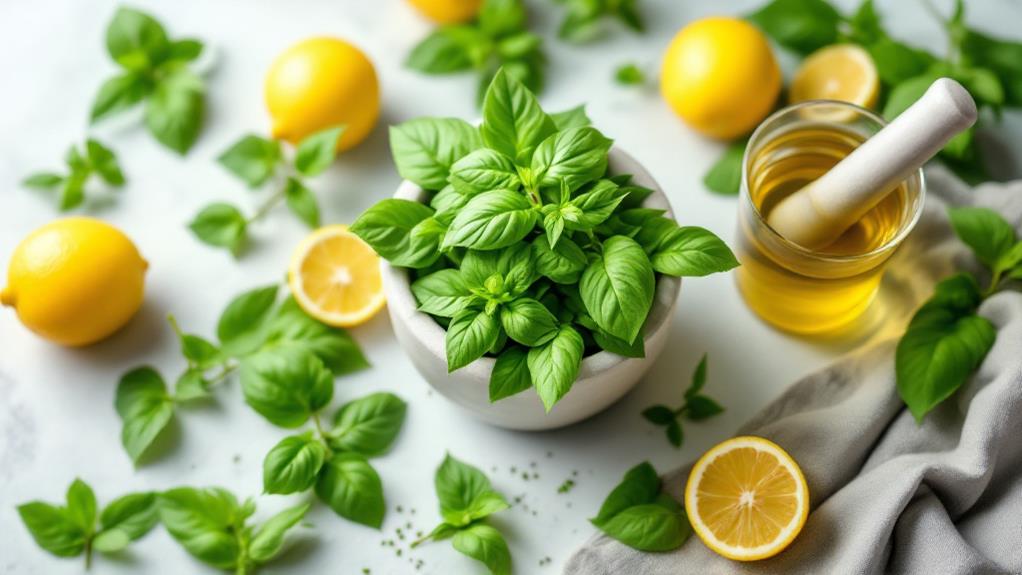
Beyond its impressive nutritional profile, this lively herb offers a wealth of health benefits that make it a valuable improvement to your diet. Lemon basil is packed with antioxidants, which play a vital role in combating oxidative stress. By doing so, it may help reduce your risk of chronic diseases. Furthermore, the anti-inflammatory properties of lemon basil can be a blessing if you suffer from arthritis or joint pain, providing relief and improving your quality of life.
Lemon basil is also known for its high content of vitamins A and C, both fundamental for supporting immune function. These vitamins aid in promoting collagen production, contributing to your skin's health and resilience. In addition, the herb's potential antibacterial properties make it a natural choice for improving food safety and preservation, while also helping in infection prevention.
Traditionally, lemon basil has been used as a digestive aid. If you experience bloating or discomfort, incorporating this herb into your diet can promote comprehensive gastrointestinal health and relieve such symptoms. Regardless of whether you're looking to elevate immune function, support skin health, or improve digestion, lemon basil's diverse health benefits are worth exploring.
Culinary Applications
Incorporating lemon basil into your cooking can improve dishes with its distinct citrusy flavor and aromatic freshness. This herb's unique flavor is perfect for a variety of dishes, making it a versatile element in your kitchen. For salads, lemon basil's citrusy notes pair beautifully with fresh vegetables and a light dressing, transforming a simple dish into something extraordinary.
Consider making a zesty pesto by blending lemon basil with olive oil, garlic, and nuts. This lively sauce can uplift your pasta, sandwiches, or even grilled chicken, providing a revitalizing twist. Regarding soups and stews, adding lemon basil towards the end of cooking guarantees you retain its delicate flavors, creating a renewing finish that doesn't overpower the dish.
Lemon basil also shines in beverages. Try infusing it in lemonade or iced tea for a unique, invigorating herbal note that will delight your taste buds. Don't overlook desserts—lemon basil sorbet is a fantastic way to introduce an aromatic and unique flavor to sweet treats. These culinary applications of lemon basil demonstrate its versatility and ability to improve your dishes in delightful ways.
Growing Tips
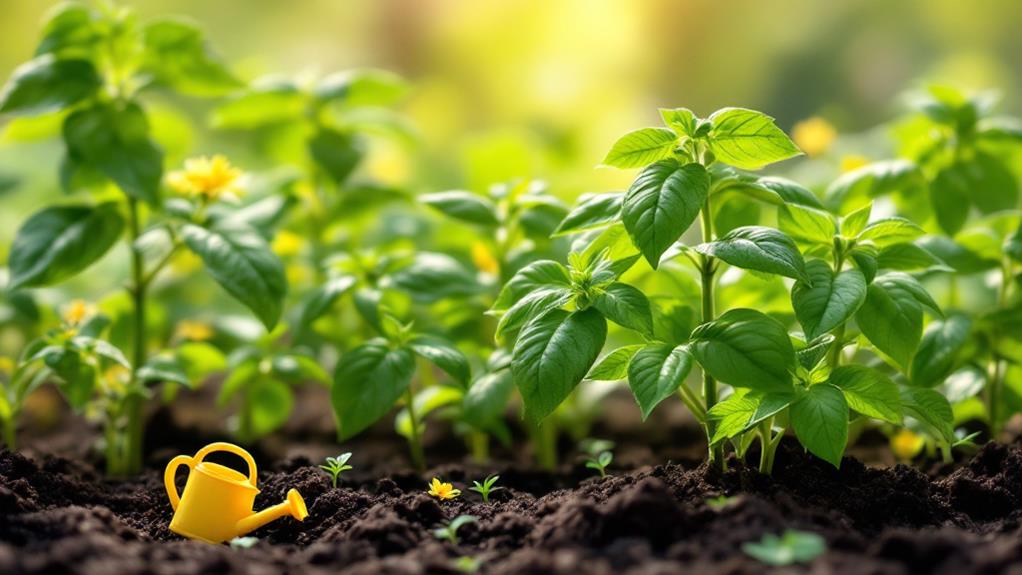
Growing lemon basil in your garden or home is a rewarding endeavor, provided you meet its specific needs. To start, make certain your basil gets full sun, as it thrives with 6-8 hours of direct sunlight each day. If outdoor space is limited, don't worry—lemon basil can be grown indoors with adequate lighting or in pots. Just be sure your plants are placed in a location that receives plenty of light.
Well-drained soil is vital for lemon basil. Opt for a fertile mix with a pH between 6.0 and 7.5. Keep the soil consistently moist, but avoid waterlogging, as this can harm the roots. The ideal temperature range for growing lemon basil is between 70°F and 85°F, so be mindful of frost or cooler temperatures that can damage your plants.
Regular pruning is significant for encouraging bushier growth and preventing early flowering. Pinch back the tips of the plants to promote branching and improve the flavor. By following these growing tips, you'll cultivate a healthy lemon basil plant that not only adds beauty to your space but also a delightful fragrance and flavor to your dishes.
Harvesting Techniques
Regarding harvesting lemon basil, timing is key to ensuring you get the most aromatic and flavorful leaves. The best time to harvest is in the morning after the dew has dried but before the heat of the day intensifies. This helps preserve the crucial oils that give lemon basil its distinctive flavor. Always aim to harvest before the plant flowers, as the vital oils are most concentrated at this stage.
To keep your lemon basil thriving, employ proper harvesting techniques. Use sharp scissors or pruning shears to cut the leaves from the top down. It's significant to leave at least one set of leaves on each stem. This encourages bushier growth and prevents the plant from becoming leggy. Regular harvesting also discourages flowering, which can reduce the flavor potency of your basil.
Storage Methods
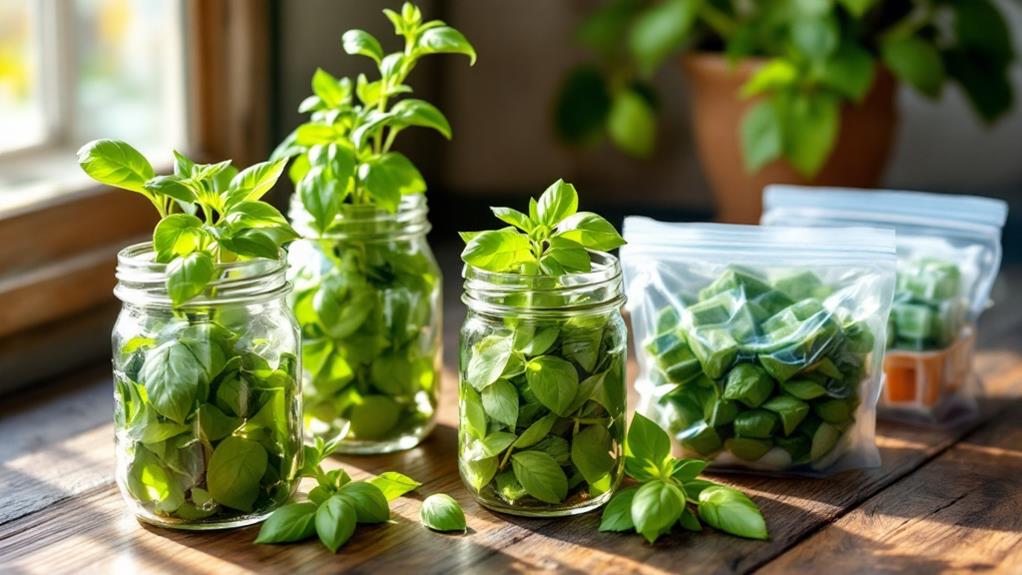
After harvesting your lemon basil at the ideal time, proper storage is key to maintaining its freshness and flavor. Start by washing fresh lemon basil thoroughly to remove any pesticides or contaminants. This step is essential for quality preservation. For short-term storage, treat your basil like cut flowers. Place the stems in a jar of water, and store it at room temperature or in the fridge to keep it fresh.
For longer storage, consider these methods:
- Blanching and Freezing: Briefly blanch the leaves in boiling water, then freeze them in airtight containers or freezer bags. This method helps preserve flavor and nutrients.
- Chopped and Frozen: Chop the leaves before freezing. This makes it easier to use directly from the freezer in future recipes.
- Dried Basil Storage: Store dried basil in a cool, dark place within an airtight container to maintain its concentrated flavor and potency.
- Room Temperature: For immediate use, you can also keep fresh lemon basil at room temperature in a jar of water.
Each storage method offers a way to enjoy lemon basil's lively flavor, regardless of being fresh or dried, ensuring you get the most from your harvest.

